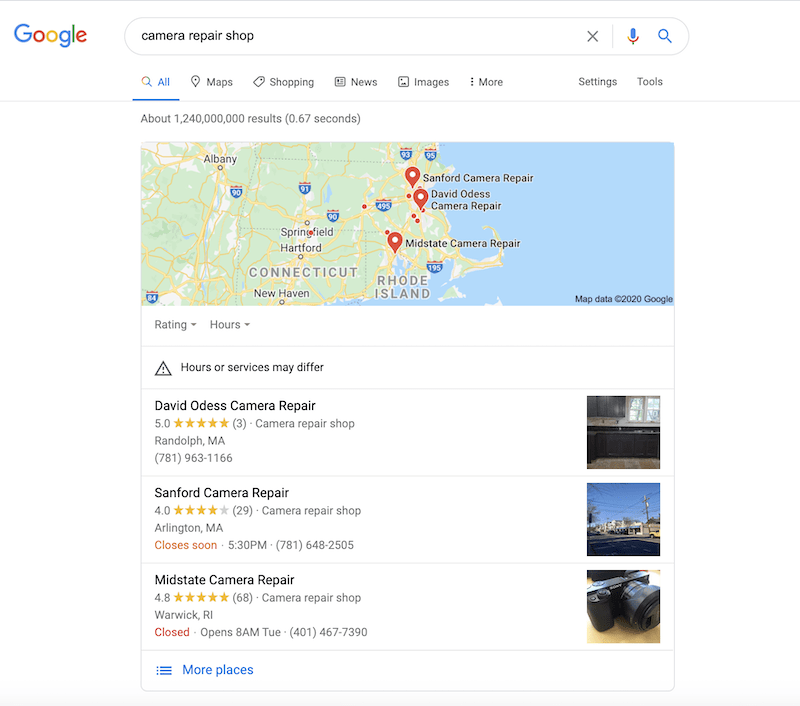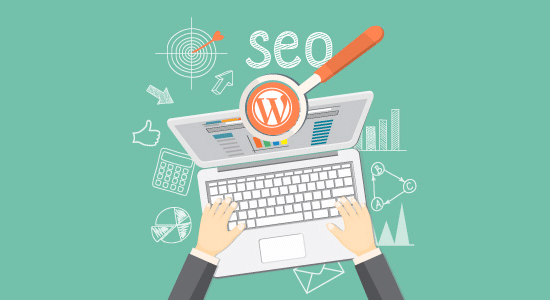With advertising costs across the roof, small businesses struggle to maintain such competition. In general, it is recommended to invest around 8% of your revenue for marketing, but why really need to invest that?
In the short term, it could be. However, for businesses that are looking for “light at the end of the tunnel” where they can ease these costs, you should look for a solution other than organic traffic.
Fortunately, we can help that. Let’s talk about small business SEO and how to build organic traffic for your business this year!
Search engine optimization is the process of modifying or building the content of your web pages in accordance with the guidelines of search engines such as Google. Doing so can help rank your web pages for relevant searches from your target readers.
Google uses “crawlers” to crawl and index billions of web pages every day, and they rank for some of the keywords that people search for. They then use several other factors from user searches and web sites that match these keywords to determine the order. This is why you don’t see a digital marketing agency when you search for “ice cream near me”.
Similarly, appearing at the top of Google searches has some serious benefits. The difference between the bottom of the first page and the top of the second page is enormous in terms of drawing traffic, so websites have to compete with each other to optimize their content for these searches. So, is it worth the effort?
SEO is not like any other digital marketing strategy, especially paid advertising. Of course, it takes some time to build a strategy, but once it’s done, you can receive rewards for years with minimal care. There is little or no need for additional costs.
Once the content is on your website, you won’t have to spend an extra dime, regardless of how much organic traffic it brings in. Also, organic traffic is simply superior to paid traffic. Think again.
When you search on Google, how often do you skip search ads to select organic results? Most people do, because they are more confident in these results. If your users start their journeys on an early record of trust, this can lead to higher conversion rates, user retention, and brand loyalty down the road.
Finally, one of the best advantages is the lack of competition. While SEO is definitely a buzzword in the marketing world, 70% of businesses still don’t have an SEO strategy, making it easier to get ahead now than it ever will be!
Before we discuss how to use SEO in your marketing strategy, there are some important basics that you need to know. This is the main pillar of a small business SEO strategy.
Keywords are a basic pillar of your SEO strategy, so don’t neglect your keyword research. Google uses keywords to match users with the right content, and if those keywords are not present in your website content, how will Google know to rank you?
Ideally, you want to diversify your keyword strategy as much as possible, especially with both long-tail and short-tail keywords. If you are not familiar with the term, short-tail keywords are obvious in any industry that you want to rank. For example, it would be a major boon for a car dealership to rank for the keyword “used cars”.
However, for local dealers to compete with industry giants such as KBB, Edmunds, and others, it would be a high battle. That’s why you should think of short-tail keywords as a long-term goal.
In the meantime, focus on diversifying your long-tail keywords. These may have less search volume, but they also have significantly less competition standing in your way. Search for keywords with the highest search volume and the lowest relative competition for the best results.
Most small businesses primarily rely on local traffic and customers to stay in business. Certainly not all, but most.
If you rely heavily on local businesses, then it is important to use local SEO principles to maximize your local traffic. To get started, using location -specific keywords can go a long way. When users search for keywords such as “pizza shop” or “dry cleaner”, search engines assume the meaning is to search for a nearby location, so they use location as a ranking factor.
Because of that, it’s important to use keywords that end with terms such as “in LA” or “near me”. On top of that, be as clear and consistent as possible both on your website and off (social media, business profiles, directories, etc.) about your location and contact information. This will help confirm your location to Google.
Finally, if you have an established place of business such as a store or office, add it to Google Maps and other popular GPS systems. This is a great way to boost organic traffic and local customer base.
Google uses over 200 ranking factors specific to the quality of your website. Without a strong web site, you’re building the earth on a broken foundation.
The reason for this is simple; if search engines are constantly promoting low quality sites to their users, it will reflect less on their services. Modern web sites will go a long way to helping you stand out in the long run!
Google’s algorithm is very good in many ways, but it can’t directly check the fact everything is indexed. How does it know who is telling the truth and who is not? There is simply too much conflicting information online for this to be a feasible approach to indexing.
Therefore, one of the most important aspects of off-page ranking is backlinks or links from other sites to yours. It acts as a voice in favor of your website, establishing authority or credibility. The more authority and relevance the site has, the more authority it will offer your site.
Sites that have a lot of backlinks have a big leg in the competition. If you are starting a new blog and writing the most comprehensive and informative article in the world about the upcoming election, a less informative article from the New York Times will probably be in front of you. They receive links every day from news outlets around the world with high domain authority, giving them huge benefits.
Fortunately, Google does not expect new web pages to have backlinks. However, it is important to incorporate this in your strategy in time. More on that later.
Now that you understand some of the basics of SEO strategy, it’s time to discuss implementation. Here are some small business SEO tips to work on your strategy.
Since your strategy relies heavily on your web pages, it’s better to build a good one in advance. Most importantly, your web page should have:
The list goes on, but this is enough for you pretty far! Once your page is optimized, it’s very easy to grow your strategy from there.
Google highly prioritizes mobile-friendly sites, since the majority of web traffic now comes from mobile devices. Make sure your web pages fit with different screens before publishing new content.
Also, your bounce rate and loading time will play a role in your SEO prospects. With a slow loading time, your bounce rate will increase, creating a “double whammy” for your strategy. Make sure that your technical SEO is optimized and you don’t use too many heavy files on your web pages to allow faster loading times.
If you don’t know what the competition is doing, how will you ever get ahead? Without competitor research, you will be left running the race in the dark. Fortunately, it’s easy to see where your competition is, even without insider information.
Your competition’s SEO strategy lies entirely on their website, which is available for you to analyze. Simply go to your favorite SEO tool or keyword research tool and enter the URL to take a complete analysis. Some of these tools are free for limited everyday use, so take this one step at a time if you want to save money.
From there, scroll to existing content to generate ideas, and make sure you keep notes! Build a list of keywords and topics that are going to compete for that you can miss. This will help you develop new content, learn industry standards, and understand what you are competing for.
Creating informative, engaging content should be your primary focus. After all, the overall goal of search engines is to match users with relevant, high quality content. If you offer them on an optimized web page, eventually you will see SEO results.
Regardless of the type of content you create (audio, blog, video, etc.), remember that you are creating it for users, not search engines. Google knows every trick in the book and will eventually catch tactics such as keyword stuffing, word count inflation, and much more. You can beat the system, but not for long.
Once Google punishes you for quality, the effects can last for a long time, even if you improve your content. We recommend always having something to say when creating content, reviewing your content before publishing, and removing anything that has no purpose for your users.
When reviewing your content, remember to optimize links, images, and more before publishing. This is the only part for search engines, because the algorithm relies heavily on context for images, infographics, videos, links, and other features.
Also, be as consistent as possible. Posting weekly is good, but try posting several times a week for the best results. SEO takes time to develop, but with the right amount of consistency, you’ll see results as soon as possible.
Directory links and social media links are important for SEO, but they don’t exactly help build domain authority. If you want to get ahead of the competition, you will need a backlink strategy. The sooner you start, the better.
There are many strategies for building backlinks, but they don’t all offer guarantees. You can try to reach out to affiliates for links, offer link exchanges, or buy links. However, paid links will come with penalties if found by Google, which they are cracking down on more heavily.
One of the best strategies for building links from other sites is to offer guest posts that link back to the intended page. By offering quality guest posts to blogs that have high domain authority, they are more likely to run. Blogs are always looking for quality content to post, and they are often willing to exchange links for interesting content.
Now that you have a guide that is useful for small business SEO, use it to your advantage. The faster you implement this tip, the faster you will see results. Just remember, SEO is a marathon, not a rush, so do your craft and take care!
Start your small business SEO campaign now and stay updated with the latest digital marketing news for more information!
Is SEO worth it for small businesses?
Contents
- 1 Is SEO worth it for small businesses?
- 2 How long does it take for Yoast SEO to work?
- 3 What increases consumer traffic?
- 4 How can small businesses improve effectiveness?
Yes, SEO is worth it. You will find that search engine optimization is definitely worth it for your small or local business. If you’re in the SEO services market or seeking a second opinion, please don’t hesitate to contact us now for a free consultation.
Why SEO is a waste of money? SEO is not dead. Don’t waste money, if and when it’s done correctly. The grass is not greener on the other hand; green ones where it has been watered. If you take care of your website it will take care of you!
Is SEO worth it for a small business?
Even if you choose to invest money in SEO, ROI can more than double if the marketing campaign is organized well. So, the simple answer is ‘yes,’ SEO is worth it for small businesses, even those that don’t operate online.
Should small businesses use SEO?
SEO is necessary for small businesses ’online presence because without it, you’re throwing money at content that most likely goes anywhere. Targeting your audience is important in marketing. Without SEO, your web page is a needle in a haystack.
What is the best SEO for a small business?
This is a roundup of the top 13 SEO tools for small businesses.
- Google Analytics. ^ image via. …
- Google Search Console. Google Search Console (formerly known as Google Webmaster Tools) is Google’s free SEO tool. …
- AgencyAnalytics. AgencyAnalytics is our platform for reporting. …
- Ranger Rank. …
- Screaming frog. …
- Ahrefs. …
- Moz. …
- SpyFu.
Is SEO still worth it in 2021?
So, why is SEO still a good investment in 2021, and beyond ?! Short answer: Yes! SEO is more important than ever! It remains one of the most powerful digital marketing strategies that leads to long -term results.
Are keywords still important for SEO 2021?
In 2021, keywords are still important and useful in SEO, but that’s not the most important factor. This is because SEO is far more complex than putting keywords on a page. Also, because SEO is always changing and search engines are constantly updating their algorithms, marketers need to change the way they use keywords.
How SEO will change in 2021?
4. Desktop Page Experience (UX-driven SEO) and Core Web Vitals. Google will gradually implement the Page Experience Algorithm in 2021. This algorithm update consists of several user experience signals, such as Core Web Vitals, that essentially evaluate the overall experience with a web page.
Does SEO have a future?
The future of SEO in 2022 also includes creating evergreen content. Content is a critical component if you want to succeed with SEO in 2022. If you don’t create content, you won’t get anything to rank in search results. If you want your content to rank in search results, you need to optimize it for search engines.
How much should a small business pay for SEO?
How much does SEO cost for a small business? The average cost of SEO for a small business is $ 750 to $ 2000 per month or $ 5000 to $ 30,000 for a one-time project. Smaller companies that invest in SEO consulting services can expect to pay $ 80 to $ 200 per hour.
Is it worth it to pay for SEO?
SEO is worthwhile if you have the right strategy in place and work with a partner who knows how to get results. About 93% of the online experience starts with a search engine, and the closing rate of SEO leads is higher than traditional marketing. Thus, SEO provides an impressive return on investment (ROI).
How much does SEO typically cost?
The average SEO cost is $ 100- $ 250 an hour for a US SEO agency. SEO costs often range from $ 2,500 â € “$ 10,000 per month for US agencies. An average SEO plan costs $ 2819 per month (per Ahrefs) Overseas SEO companies can charge $ 10- $ 50 an hour.
How much should you budget for SEO?
To generalize, most SEO experts will charge a monthly recurring investment of $ 3,000 to $ 10,000 per month. A national or international SEO budget should never be less than $ 5000 per month and it is possible to kick-off a local SEO campaign in the range of $ 500 to $ 2500.
How long does it take for Yoast SEO to work?

Generally web sites can see results in 4 to 6 months. Clearly, SEO results grow over time. The attraction that you want in 6 months is usually less than that you should experience in 12 months.
How long did Yoast take SEO? Many SEO firms will state that it takes 4 to 6 months to start seeing results. They are generally accurate, but remember that this is when you first see results, and SEO results will improve over time. Whatever results you want in 6 months should be a little more than you want in 12 months.
How long does it take for SEO to start working?
Although I honestly say there is no definite answer as to how long before you see organic improvement from your SEO efforts, most subject matter experts agree that it usually takes four to six months: “In general, web sites can see results in 4 up to 6 months.â € â € “SEO Mechanic.
Why does SEO take so long to work?
SEO takes so long because there are several factors involved to get results: SEO keyword difficulty, competition, inbound links, and domain age. Therefore, SEO can take a longer or shorter time depending on how you approach these key search engine optimization areas.
How do you know if SEO is working?
If you see that your backlinks go up, your SEO efforts can work properly. If you see that the number of organic keywords on your web pages has also increased, it’s safe to assume that you’re targeting the right keywords for your industry and using them successfully in your content.
How long does SEO take to Work 2022?
This is a quick answer about how long SEO to start working in 2022: At least 6 months. It’s a considerable amount of time to notice good results from your SEO efforts (if you’ve done it right!). However, 6-12 months is the ideal time frame you will see positive gains from your SEO strategy.
Does Yoast SEO Really Work?
Yes, Yoast SEO really works! Yoast SEO has been the most popular SEO plugin in WordPress for 11 years now. In fact, it got over 11 million downloads and a 5 star rating! You don’t stay long in the game if you don’t have something to show it.
Is Yoast SEO Pro worth it?
If you want Yoast SEO Premium reviews to be honest, it’s not worth $ 89 / year because there is no direct SEO improvement. SEO analysis is useless for targeting multiple focused keywords, there are free redirect plugins, and content insights are a poor attempt to measure keyword density that is barely there.
Do I really need Yoast SEO?
There are tons of “hidden features” in Yoast SEO. Without the need for user intervention, Yoast SEO solves many technical SEO problems that your site can only suffer. Every site that wants to be found on search engines benefits from this feature. Every site needs them.
Is Yoast good for SEO?
Yoast SEO is one of the most popular WordPress plugins. It is also one of the best SEO plugins for WordPress web sites.
How long does it take for SEO backlinks to work?
It takes backlinks an average of 10 weeks to work for SEO on a link-by-link basis. But if you build multiple backlinks at once, then the effect will happen faster. The three attributes that govern the rate at which a backlink works include domain authority, keyword competitiveness, and link type.
How long does SEO take to Work 2020?
Unlike other popular marketing channels, SEO does not work instantaneously. Most professionals expect to see results in under 2 months, but SEO can take as much as 12 months to work. Although each company’s SEO strategy is different, most businesses can expect to see decent results in 6 to 12 months.
How long does it take for backlinks to take effect?
It may take a few days for new links to be indexed. The results show that a single backlink takes an average of 10 weeks to push a page to a higher ranking on Google. If you are lucky enough to receive multiple links at once, you have a higher chance of crossing other pages at an exponential rate.
How long does it take Google to recognize backlinks?
How long does it take for Google to Index Backlinks? On average, it can take Google around 10 weeks to index a new backlink. However, this is only an average time, and it can be faster, slower, or never. There are several factors that will affect how quickly Google indexes backlinks and how they rank.
What increases consumer traffic?

One of the most important strategies to attract more foot traffic is marketing. After all, marketing helps expose potential customers to a brand’s products and services. It can also allow retailers to engage deeper with customers and create loyal customers, especially through mobile, web, and social media.
What is high customer traffic? The amount of foot traffic is heavily monitored by store owners in particular retail stores, such as department stores. Foot trafficâ € ”or customer trafficâ €” is an important metric because higher foot traffic tends to lead to higher sales and revenue numbers. However, foot traffic alone is not enough to generate new sales.
How do businesses increase traffic?
7 Ways To Increase Foot Traffic To Your Small Business
- Start from the outside and look inside ….
- Host community events with newsworthy tie-ins. …
- Host a seminar or workshop. …
- Use location -based services to pull the pass. …
- Engage old customers in new ways. …
- Put on your small business customer service hat. …
- Stay friendly.
What is consumer traffic?
Customer Traffic means ILD Traffic that is related to the Customer under the offer of products and services that are related to its consumers (including through resale and distribution channels), but does not include Outgoing Traffic.
What is the meaning of store traffic?
Definition of store traffic in English the number of people who enter the store: Profits have remained low despite promotional efforts to increase store traffic.
What is customer traffic data?
Customer Traffic Data means the delivery of Customer activities collected in the Daily Statistics Sheet through the Agent Portal; Sample 1.
How can small businesses improve effectiveness?

Sometimes it’s a good idea to keep a handy checklist to remind yourself of the basic steps you need to take on a regular basis.
- Keep Financial Score. …
- Set Goals. …
- Use High-Impact Marketing. …
- Business Master Presentation. …
- Monitor Trends. …
- Coaching Your Selling Skills. …
- Find best practices. …
- Motivate Staff.



